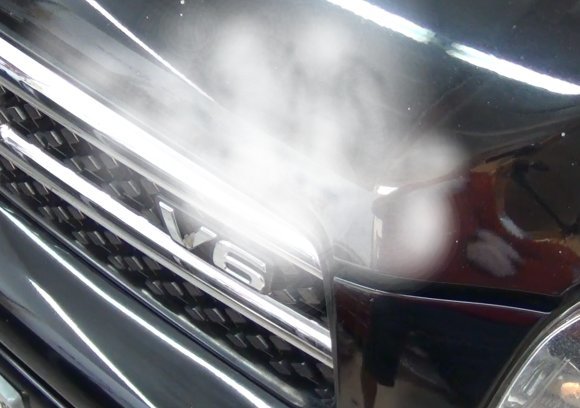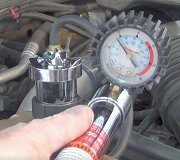It is very likely your car is going to develop a coolant leak at some point in its life, but you have no way of knowing when. Naturally when that occurs you want to look at the car's history to see if there is a cause that might be prevented from happening again. There are dozens of things that happened in the last four days, including changing the oil, but there is no way to lay blame on any of them until we know what is wrong.
What concerns me more is the knocking sound. That is indicative of serious engine problems and is very unlikely to be caused by low coolant unless you overheated the engine the night before. Then the legitimate question would be if the mechanic checked the coolant level as part of the oil change service. Typically they top off all fluids other than brake fluid, and they document anything they find wrong including a really low fluid.
There is another problem related to the cooling system that only affects GM vehicles. That is their use of the red Dex-Cool antifreeze. On the cars it says to replace it every three years, but they advertised it as "lifetime" antifreeze to make their cost of maintenance appear lower than that of their competitors. Even the Dex-Cool company says to replace it every two years because that is when the additives in it wear out. Those include water pump lubricant and corrosion inhibitors. Even if the antifreeze is replaced every two years, acids form in the coolant that do not get neutralized, and that can lead to corroded and leaking radiators and heater cores. As I said, this is real common on GM vehicles. You might notice an oily film on the inside of the windshield that gets slowly worse over many weeks, from a leaking heater core. You could have a sudden cracked radiator. You could have a corroded cylinder head gasket that is going to corrode all the way through in a week, but one brief burst of wide-open-throttle builds enough pressure to make that leak occur sooner. That type of leak was non-existent one minute, and serious the next minute, and is just the nature of the way this type of problem occurs. It can have nothing to do with anything that was done to the car. This is why you have to determine exactly what is leaking before you can figure out why, and potentially lay blame.
If you cannot find coolant leaking under the hood or onto the ground, a leaking head gasket is the best suspect. Looking for water dripping from the tail pipe is not a good observation because one of the byproducts of a properly-working catalytic converter is condensed water vapor, so that is normal. However, if you see red water dripping, it is a leaking head gasket. If that is bad enough it can cause knocking in the engine that is otherwise not harmful, and will go away once the repairs are done.
You can also add a small bottle of dark purple dye to the coolant, then search a day later with a black light to find the leakage. The dye will show up as a bright yellow stain that you can follow back to the source. If the head gasket is leaking, you will find the dye inside the tail pipe. Auto parts stores will have the proper dye for the fluid being checked, and those that rent or borrow tools should have a black light.
Sunday, July 24th, 2016 AT 4:31 PM


